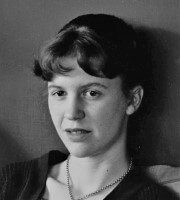by Paisley Rekdal
Because her grandmother loved
the arts, her father said, she’d willed
the money to a distant cousin
working as a sculptor. A decision
made the month before she’d died
from cancer, which the young woman
cannot now believe was due
only to a brain tumor, having endured
the last, deliberate ways her grandmother asked
why she’d never married.
The cousin who inherited the money,
showed her sculptures in a converted barn:
the only space large enough to contain
the seething shapes that seemed to flame
up from their pedestals
in precarious arcs. An audacity
of engineering the young woman
tried not to see as a reproach
when, curious, she visited:
how the sculptures made her feel
too earthbound, solid. At the gallery,
she stared a long while at what she thought
was a tree blasted by lightning,
but the more she looked, the more clearly
shapes emerged. There
were a man’s hands gripping a slender figure
by the waist, the thin body writhing,
frozen in his arms. It was
a girl, she saw, with shredded
bark for breasts and dark, charred wood
for legs, as if the limbs had been snatched
from a fire while burning.
Her twig hands raked
her captor’s face. The young woman
could read no emotion on it,
however: the plank face
had been scraped clean; all the fear
and anger burned instead inside
their twisting bodies: she could see
the two there stuck at a point
of perfect hatred for each other: she
for his attack, he for her resistance,
perhaps the beauty he could not
stand in her, as her last date in college
had hissed, “You think
you’re so fucking pretty,” spitting it
into her face so that she’d had to turn
her cheek to wipe it, which was when
he’d grabbed her arm, pinning her—
Was this why her cousin had been chosen, to make
what she’d had no words for?
Persephone, the piece she stood
amazed before had been titled: the last,
perhaps unconscious gift of her grandmother.
“For your wedding,” she’d said
during her last week, pointing
to her own open palm in which
nothing rested. Perhaps
her grandmother had imagined
a gold ring there. Perhaps a string
of thick pink pearls. The young woman
drove home from the gallery, took a shower,
and did not tell anyone that day
what it was she’d seen. A month later,
in the mail, a package came
from her father: her grandmother’s Singer
sewing machine, its antique brass wheel
scrubbed of gold, the wooden handle
glossy with vines of mother-of-pearl.
It was lovely, and for a moment
she considered sewing a quilt with it,
onto which she might embroider
shooting stars in reds and saffron, the figure
of a child, perhaps, or of a man
by a house’s courtyard, his hat
in his hands, his broad body
naked, harmless.
How much thread would that take
to make? she wondered. And considered it
a long while before packing up
the machine again, sliding it back
into its wood crate and high up onto a shelf
of her basement closet. The place she kept
some books, old clothes, and college papers,
where she told herself it could wait.





